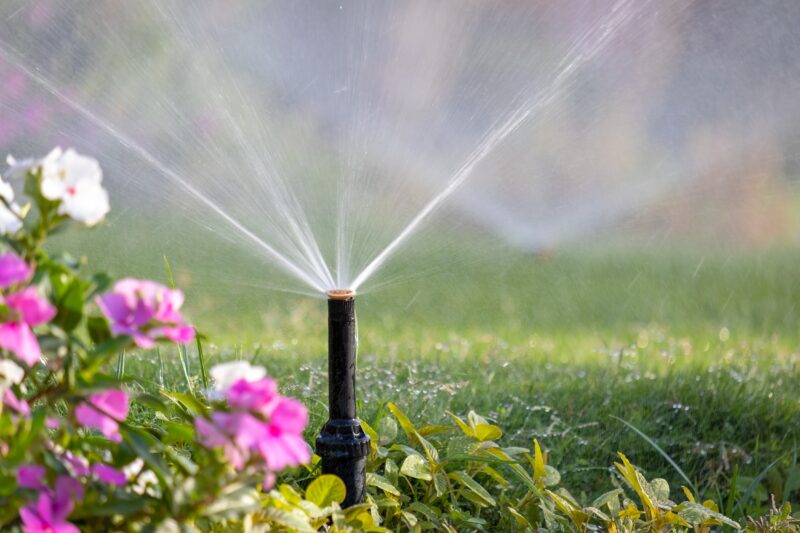Irrigation is the backbone of any thriving landscape, ensuring your lawn and plants get the water they need to flourish. However, choosing the best irrigation system for your property can feel overwhelming with so many options available. A well-chosen irrigation system saves water, reduces maintenance efforts, and supports healthy plant growth. Let’s explore the factors to consider when selecting the right irrigation system for your needs and how Elements Lawn & Landscape can help bring your vision to life.
Why Irrigation Matters
An efficient irrigation system ensures that your lawn, flowerbeds, and garden receive consistent hydration, regardless of weather conditions. Without proper irrigation, plants can experience stress, leading to wilting, poor growth, or disease. A carefully planned system reduces water waste and optimizes water delivery, promoting a greener and healthier lawn.
Factors to Consider When Choosing an Irrigation System
Before diving into the various types of irrigation systems, it’s essential to assess your property’s unique needs. Below are the key factors to consider:
Climate
The climate in your region significantly impacts irrigation needs. In warmer climates like Austin, TX, where water conservation is vital, systems that minimize evaporation and maximize water efficiency are ideal.
Soil Type
Different soil types absorb and retain water differently. For example:
- Sandy soil drains quickly, requiring more frequent watering.
- Clay soil retains moisture, so overwatering can lead to puddling and root rot.
- Loamy soil strikes a balance and works well with most irrigation systems.
Landscape Design
Take stock of your property’s layout. Are there sloped areas, flowerbeds, or specific plants with varying water requirements? Customizing your irrigation system to your landscape ensures that each area receives adequate hydration without oversaturating or neglecting specific zones.
Water Source
Consider the availability and cost of water. A system that pairs well with your property’s water pressure and source—whether it’s a municipal supply, well, or rainwater collection system—will ensure efficiency.
Types of Irrigation Systems
Sprinkler Systems
Sprinkler systems are one of the most popular irrigation methods, ideal for lawns and wide-open areas.
Types of Sprinklers:
- Stationary Sprinklers: Provide consistent watering in a fixed pattern.
- Rotary Sprinklers: Distribute water in a rotating motion, perfect for larger areas.
- Pop-Up Sprinklers: Retract into the ground when not in use, preventing tripping hazards and maintaining a clean lawn appearance.
Pros:
- Effective for lawns and evenly distributed areas.
- Easy to automate with timers.
Cons:
- Prone to water loss through evaporation.
- Not ideal for plants requiring deep watering.
Drip Irrigation Systems
Drip irrigation is highly efficient, delivering water directly to the roots of plants through tubes, emitters, or perforated hoses.
Best For:
- Flowerbeds, shrubs, and gardens.
- Areas with plants requiring precise watering.
Pros:
- Minimizes water waste due to evaporation or runoff.
- Promotes plant health by preventing overwatering.
Cons:
- Requires more upfront planning and installation.
- May need regular maintenance to prevent clogging.
Soaker Hoses
Soaker hoses are porous hoses that slowly release water directly into the soil along their length.
Best For:
- Vegetable gardens, flowerbeds, and small lawns.
Pros:
- Affordable and easy to install.
- Reduces water waste and soil erosion.
Cons:
- Limited reach; may not be suitable for large properties.
- Can degrade over time if exposed to sunlight.
Surface Irrigation
Surface irrigation involves manually or mechanically applying water to the soil surface. It relies on gravity to distribute water.
Best For:
- Agricultural fields or areas with uniform, flat surfaces.
Pros:
- Simple and cost-effective for large areas.
- No specialized equipment is needed.
Cons:
- High potential for water waste through runoff and evaporation.
- Labor-intensive to manage.
Smart Irrigation Systems
Smart irrigation systems leverage modern technology, such as weather-based controllers or soil moisture sensors, to deliver precise watering based on current conditions.
Best For:
- Homeowners seeking water conservation and efficiency.
- Properties with varying landscape zones.
Pros:
- Reduces water waste.
- Allows remote control through apps.
Cons:
- Higher initial investment.
- Requires some technical know-how for setup and management.
Choosing the Best Irrigation System for Your Needs
Evaluate Your Goals
Are you looking for a low-maintenance solution, or do you prioritize water conservation? Understanding your primary goals will help narrow down your options.
Determine Your Budget
While upfront costs can vary, consider long-term savings from reduced water bills and maintenance when evaluating your budget.
Seek Professional Guidance
Designing and installing an irrigation system can be complex. Professionals like Elements Lawn & Landscape assess your property and recommend the ideal system to fit your landscape and budget.
Benefits of Professional Irrigation System Installation
Customized Design
A professional team considers every aspect of your property, from soil type and plant selection to water pressure and sunlight exposure.
Efficient Water Use
Proper installation ensures that water is evenly distributed, reducing waste and preventing dry spots or overwatering.
Long-Term Savings
While DIY systems might seem cost-effective, professional installation minimizes future repairs and maintenance, saving money in the long run.
Automation Options
Professionals can integrate advanced features like timers or smart controllers, making your irrigation system nearly hands-free.
Maintenance Tips for Your Irrigation System
Even the best irrigation system requires regular upkeep to remain efficient. Here are some tips:
- Inspect for Leaks: Check hoses, emitters, and sprinklers for signs of wear or damage.
- Clean Filters: Clogged filters can disrupt water flow and reduce system efficiency.
- Adjust Seasonally: Modify watering schedules based on seasonal changes and plant needs.
- Winterize Your System: In colder climates, drain and insulate your irrigation system to prevent freezing.
Why Choose Elements Lawn & Landscape?
At Elements Lawn & Landscape, we understand that every property is unique. With over 20 years of experience in the Austin, TX, area, we specialize in creating customized irrigation systems tailored to meet your needs. Whether you’re looking to install a new system or upgrade your existing one, our team ensures professional design, installation, and maintenance for a lush, healthy landscape year-round.
Transform Your Lawn with Elements Lawn & Landscape
Ready to choose the best irrigation system for your property? At Elements Lawn & Landscape, we work hard so you don’t have to. From lawn care fertilization and weed control to landscape design and installation services, our expert team is committed to “Keeping Austin Green.”
Contact us today to schedule a consultation and transform your lawn into the envy of the neighborhood. Together, let’s make your landscaping dreams a reality!


